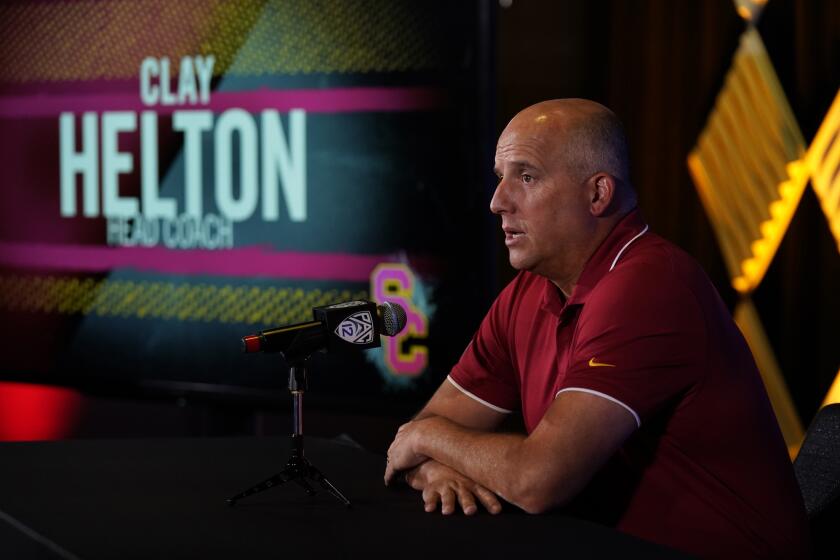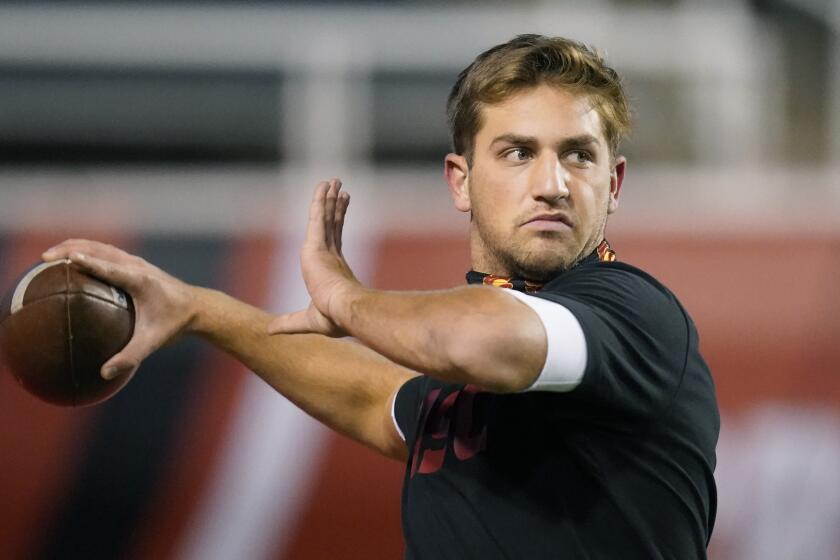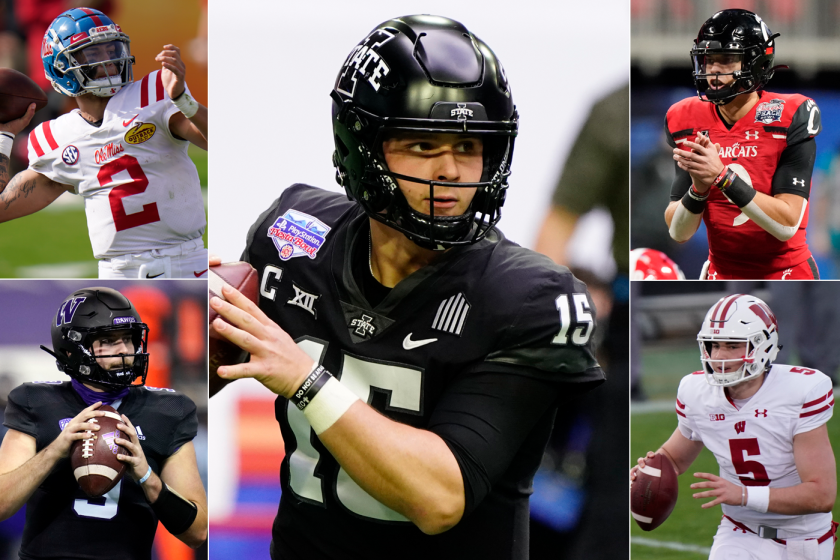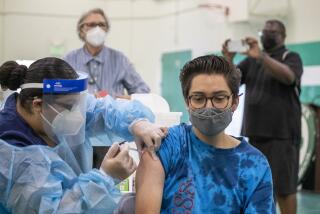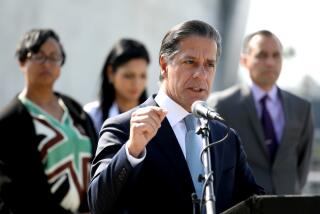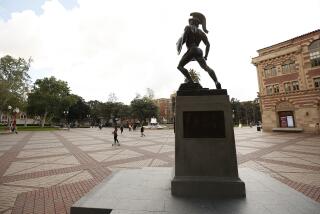How L.A. County COVID rules could adversely impact USC and UCLA football teams
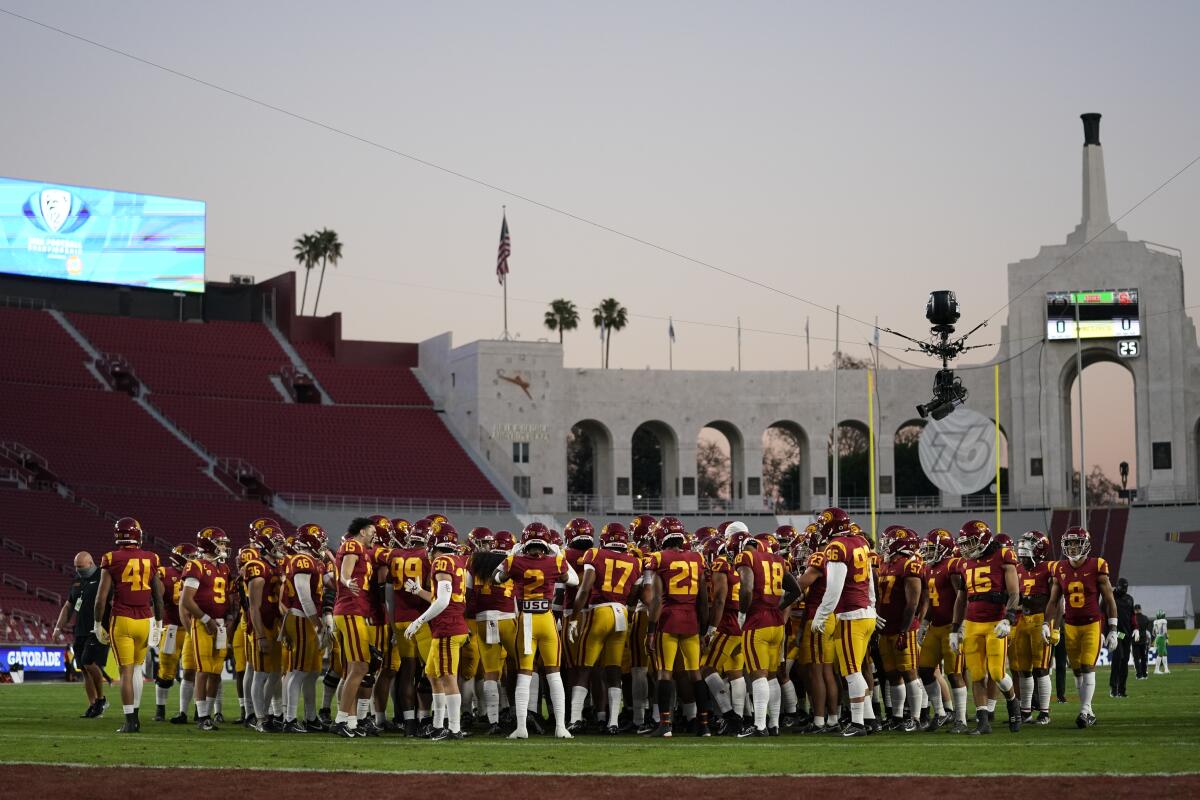
- Share via
After a difficult year disrupted by stringent restrictions and ever-changing protocols, the promise of a college football season largely unburdened by the pandemic was a powerful incentive as USC urged its football players to get the COVID-19 vaccine this summer.
The message during USC’s vaccination drive was clear: Getting the vaccine was the first step in clearing a path back to normality on campus and in college athletics. For vaccinated athletes, there would be no surveillance testing, no masking, no quarantining. Only the unvaccinated would be forced to relive the frustrating realities of the 2020 season, when one positive test could send a program into a spiral.
That remained the case as the USC football team’s vaccination rate climbed past 90% in late July. Last week, USC coach Clay Helton announced 119 players were fully vaccinated — of 124 listed on the official roster — while the only holdouts had received medical or religious exemptions to be compliant with the university’s vaccine requirements.
But in the weeks between, as the Delta variant spread across the country, assurances of a less restrictive season for vaccinated players began to evaporate. Masks returned, as did surveillance testing. And then, on Aug. 6, L.A. County public health officials sent out new, stricter guidelines for universities that sent some within USC’s athletic department into a panic.
Here’s a closer look at each of USC’s matchups in the 2021 college football season, which starts Sept. 4 against San Jose State at the Coliseum.
Under guidelines that were briefly in place before they were updated, vaccinated students exposed to COVID-19 would be subject to a modified quarantine of three to five days. The guidelines applied only to college students in L.A. County — not university staff — and still allowed for said students to attend “on-campus classes and academic activities if they are consistently and correctly masked and remain asymptomatic.”
But while vaccinated college athletes in the county could attend indoor classes, any exposure to COVID-19 would leave them unable to play in — or attend — any team practices, training or competition, leaving both USC and UCLA at risk of another football season interrupted by the pandemic — even as both programs’ vaccination rates significantly exceeded the national average.
An uproar at both schools ultimately led county health officials to loosen the guidelines last week, but not before several USC players were forced to quarantine for stretches of preseason camp. The updated rules, published Aug. 24, now allow for vaccinated athletes exposed to COVID-19 to continue taking part in practice and competition as long as they remain asymptomatic and test negative for five consecutive days.
After a seemingly successful season that was really a struggle, USC quarterback Kedon Slovis says he’s fixed his mechanics and again enjoys football.
Even with the modifications, the policy is among the strictest in the country for vaccinated college athletes. One university official said that they believed USC and UCLA were the only two Football Bowl Subdivision programs subject to such rules for vaccinated athletes.
As USC prepares to open its season Saturday against San Jose State, the sudden shift in protocol has prompted questions about how local restrictions could affect the Trojans’ season. It’s still unclear how the program will handle testing if vaccinated close contacts are forced into a five-day modified quarantine on the road, while a false positive at any point in the process could produce a domino effect down the roster.
Contingency plans are still being formulated. Helton said last week that USC is preparing for the possibility that one of its coaches, all of whom are vaccinated, could test positive. Coaches, however, are not subject to the updated county guidelines for vaccinated college students.
“You’re one infection away, and I would be out 10 days or a coordinator would be out 10 days,” Helton said, whose staff is also subject to USC and Pac-12 rules regarding positive test results. “And so it’s something that we have planned for, we have prepared for, and we’ve given some reps and experience to other guys to be able to be in that position.”
The 2021 college football season will see plenty of the same dominant programs at the top of the rankings, but here are five teams set to play spoiler.
The fallout from such a disruption will be more consequential this time around. Unlike last season, when canceled games were declared no-contests by the conference, teams unable to play because of COVID-19 can be forced to forfeit, at the discretion of new Pac-12 Commissioner George Kliavkoff.
For most of the Pac-12, that shouldn’t be a problem. At least seven conference teams have reached or exceeded 90% vaccinated while two more teams have reached 85%, according to the San Jose Mercury News. USC’s vaccination rate is believed to be above 95%, while UCLA coach Chip Kelly said in late July that his team was 98% vaccinated.
Those rates, among the highest in college football, once seemed to assure both L.A. schools a more normal college football season. But as the Delta variant spurs more cases and protocols continue to change, it appears normal might be off the table.
More to Read
Fight on! Are you a true Trojans fan?
Get our Times of Troy newsletter for USC insights, news and much more.
You may occasionally receive promotional content from the Los Angeles Times.

